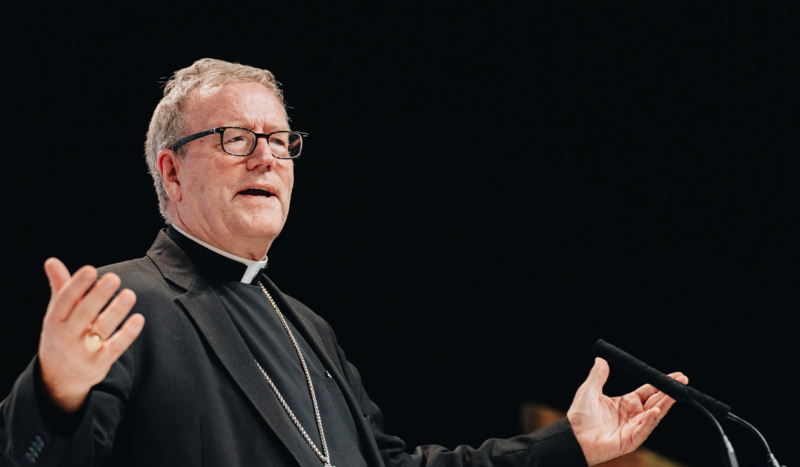
ARC Forum / Flickr
Bishop Robert Barron of the Diocese of Winona-Rochester in Minnesota took to social media Sunday night to respond to a Minneapolis Star-Tribune columnist who criticized his words of encouragement for Americans to carry their faith into public spaces instead of keeping it exclusively in their houses of worship.
“A rather silly article appeared in the Sunday edition of the Minneapolis Star-Tribune concerning my participation in the President’s Religious Liberty Commission,” the bishop posted to the X platform. “The author, Karen Tolkkinen, claimed that I ‘advocate erasing the boundaries between church and state.’ This is a gross mischaracterization of my position.”
The bishop went on to cite the Constitution’s First Amendment in response to Tolkkinen, who, on Sunday, accused him of engaging in an “unnecessarily militant turn of phrase” when he observed during the hearing the pervasive threats to religious freedom in our nation today and the need to strongly resist such oppression.
Expressing his full backing of the First Amendment, Barron agreed it “does indeed say that Congress shall make no law respecting the establishment of religion, and I completely support this.”
“But the amendment contains a second clause in regard to religion, namely, that Congress shall make no law ‘prohibiting the free exercise thereof,’” he added. “Though there can never be an official American religion, there can indeed be expressions of religion in the public space and in civic life.”
During the commission’s first hearing, Barron asked whether “we religious people” have been “too cowed by a secular society that wants us to privatize the faith, that we haven’t seized the opportunity of the First Amendment?”
He then suggested that Americans of faith “invade that space” of the public square.
“Live your faith boldly and publicly,” Barron urged again after the hearing in an interview with EWTN – a recommendation that, as it turns out, likely sums up the central theme of his global media evangelization apostolate Word on Fire – now 25 years old.
“Proclaim Christ in the Culture,” is the website’s opening call to its followers across the globe.
But Tolkkinen appeared to be vexed by Trump’s Religious Liberty Commission – wondering why it even exists and why “religion seems to be making a comeback in American civic life.”
“In an era where Americans increasingly don’t practice religion, it can be difficult to understand the motives or reasoning of those who do,” she wrote in what seemed to be her own attempt at reasoning. Ultimately, however, the columnist apparently decided this concerning phenomenon needs a watchdog.
“[A]t a time when many are alarmed by the rise of Christian nationalism, let’s make sure nobody’s rights are getting trampled,” she asserted, adding that, “if we’re going to talk about religious liberty, let’s talk about the flip side, too: religious oppression.”
Tolkkinen then unloaded on the Supreme Court’s recent ruling that upheld Tennessee’s law protecting children with gender dysphoria from being subjected to experimental drugs and surgeries.
“It was hard to listen to members of the commission yap about the right of parents to raise their children as they wish when the Tennessee mother of a transgender girl is heartbroken that the U.S. Supreme Court’s six conservative members ruled Wednesday that the state has the right to prevent her daughter from receiving puberty blockers and other drugs simply because she is transgender,” Tolkkinen wrote. “These drugs are safe and are routinely given to other children, but I’m guessing that Tennessee’s action had more to do with religious beliefs than any real concern about her health.”
But Barron confronted the columnist’s apparent irritation at religion’s newly-resurrected role in American culture.
“Ms. Tolkkinen represents the elite liberal class that, unfortunately, controls many of the institutions of our society,” the bishop wrote. “What she and her colleagues fear the most are confident and assertive religious people who refuse to stay sequestered in private. So I say: fight hard against any formal establishment of religion, but fight just as hard for the right to exercise religion in the public space.”
Barron went on to assert the deep significance of religious liberty in America’s founding – a point that, he said, has been disregarded by some in the judiciary in the past.
“The relegation of faith to the private sphere, which has been encouraged by some of the regrettable jurisprudence of the last seventy-five years, is happily being overturned by a number of recent decisions of our Supreme Court,” he noted. “It is no accident, in fact, that freedom of religion is the first liberty guaranteed in the Bill of Rights. For if the capacity to express one’s deepest moral convictions in public is denied, all of the other freedoms can and will, in time, be denied.”
